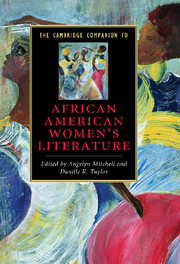Book contents
- Frontmatter
- Introduction
- Part 1 History, contexts, and criticism
- Part II Genre, gender, and race
- 6 African American women and the United States slave narrative
- 7 Autobiography and African American women’s literature
- 8 “Even some fiction might be useful”: African American women novelists
- 9 African American women poets and the power of the word
- 10 African American women in the performing arts
- 11 African American women writers of children’s and young adult literature
- 12 African American women essayists
- 13 African American women writers and the short story
- 14 African American women writers and popular fiction: theorizing black womanhood
- Bibliography
- Index
7 - Autobiography and African American women’s literature
from Part II - Genre, gender, and race
Published online by Cambridge University Press: 28 July 2009
- Frontmatter
- Introduction
- Part 1 History, contexts, and criticism
- Part II Genre, gender, and race
- 6 African American women and the United States slave narrative
- 7 Autobiography and African American women’s literature
- 8 “Even some fiction might be useful”: African American women novelists
- 9 African American women poets and the power of the word
- 10 African American women in the performing arts
- 11 African American women writers of children’s and young adult literature
- 12 African American women essayists
- 13 African American women writers and the short story
- 14 African American women writers and popular fiction: theorizing black womanhood
- Bibliography
- Index
Summary
Black women's autobiographical writing in the Americas has been shaped by a unique literary inheritance, by challenges faced, and by day-to-day experience. The inheritance is a rich one rooted not only in written literary models, but also in the African American oral tradition of spiritual narrative and bearing witness, in traditions of protest, in work song and blues, in Anglo- European aesthetic and linguistic models, and in rich and subtle variations of diverse and creolized origin. In Black Women Writing Autobiography (1989), I argued that black women autobiographers constitute a tradition within a tradition, operating within the dominant, familiar, and essentially masculinist modes of autobiography. Simultaneously, however, these same black women writers reshape and redefine their inherited formulae.
Defying every attempt to enslave or diminish them or their self-expression in any way, black women autobiographers liberate themselves from stereotyped views of black womanhood, and define their own experiences. In the parlance of Audre Lorde, black women writers attempt to dismantle the master's cardboard house of false superiority, threatening not only the notion of “whiteness” but also patriarchy and with it the very idea that man is closer to God than woman. They construct instead a uniquely black and female autobiographical self, leaving a literary legacy and providing guidance, encouragement, and direction both for readers and for future literary trends. This chapter does not propose to cover every instance of black women's autobiographical writing, but rather to pursue the relationship between letters and liberation in representative examples of black women's writing as they develop in response to the challenges faced by successive generations.
- Type
- Chapter
- Information
- The Cambridge Companion to African American Women's Literature , pp. 128 - 149Publisher: Cambridge University PressPrint publication year: 2009
- 2
- Cited by

